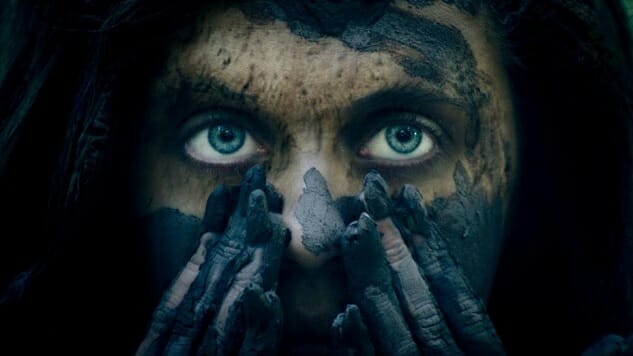
Fritz Böhm’s Wildling plays like a solid first draft, creative, atmospheric and just familiar enough to make its creative atmosphere stand out. Combine details and themes from movies like The Howling, Raw and Ginger Snaps, buttress them with a bit of YA-level romance, and you have the fundamentals of Böhm’s story down. It’s his fondness for folklore’s dreadful magic that gives Wildling an identity separate from Böhm’s influences.
As good folklore tends to, the film suffuses fantasy with darkness, spinning mythological origins for an extinct race of hirsute wood-dwelling monsters in the wilds of rural America. The person doing most of the spinning here is Brad Dourif, playing a man only referred to as “Daddy” by his daughter, Anna. Daddy puts Anna to bed at night telling her about those monsters, the wildlings, warning her to stay indoors lest they get their claws on her. As a precautionary measure, he ensures she stays in bed at night by electrifying the handle on her bedroom door. Tucking your kid in for the evening is good parenting. Shocking them for their protection is bad parenting. Daddy isn’t quite who we think he is, and Anna isn’t what she seems, either.
This makes up the bulk of Wildling’s prologue, by far the best stretch of the movie for its refusal to explain itself or exposit on backstory. Böhm tosses us in the deep end. It helps that the wildling is basically kin to werewolves, and it helps that Dourif is front and center in these scenes, too: He’s a known quantity in a scenario composed of known quantities, but his presence has more immediacy that the film’s genre elements. Daddy becomes our focal point right off the bat, which makes his quick (but temporary) exit via shotgun blast to the mouth all the more jarring. From here, local cops discover the teenaged Anna (Bel Powley) and put her in the care of the town sheriff, Ellen Cooper (Liv Tyler), and her brother Ray (Collin Kelly-Sordelet). Wildling becomes a supernatural fish-out-of-water slash coming-of-age flick.
Not coincidentally, the change in tone hamstrings the movie’s pace. Watching Anna slowly realize that she’s going through “changes” (her nails start growing longer and sharper, her fangs begin to come in, her appetite for meat becomes nigh insatiable) has its merits, and Powley is a dynamic performer to boot. She embraces the role without presenting any signs of self-consciousness, bringing bits and pieces of her past work, notably 2015’s The Diary of a Teenage Girl, into Anna’s struggles with emerging womanhood. On the cusp of maturity, she’s a delight: Her innate charm bursts through Anna’s apparent eccentricity and naivety, and she finds smart, nuanced ways of communicating her fear of the unknown when the unknown is her own body.
Good as she is, she can’t distract from discrepancies between Anna’s surrogate parents, both in terms of who plays them and how Böhm’s script uses them. Tyler isn’t a bad actor. She just isn’t Dourif. More importantly, Ellen isn’t written half as well as Daddy, so when she replaces him as a pillar in Wildling’s plot, Tyler ends up shouldering an outsized burden. Dourif is aces at making morbid, grim or otherwise creepy material sound downright innocuous, which is precisely Daddy’s modus operandi: He administers routine inoculations against untold maladies to Anna with a pediatrician’s avuncular bedside manner, he talks about sending his dog to “a better place” as casually as one lists off directions and the way he spins a yarn about wildlings, you’ll assume he’s merely telling fairy tales instead of something more sinister. The allure of Dourif’s macabre charisma is impossible to resist.
Tyler is a gentler actor, and Ellen a less authoritative figure despite the badge worn on her coat. As a contrast to Dourif, she’s soft. As a contrast to Daddy, she’s surprisingly absent. Apart from one or two spare moments here and there, including a tub scene where Ellen and Anna bond over shaved legs, Ellen nearly feels superfluous to the plot and to Anna’s arc. You couldn’t cut her out of Wildling entirely, but she doesn’t exactly qualify as essential, which raises questions about why Böhm sidelines Daddy at all. The film is at its most cohesive when exploring tensions between Anna and her pseudo-father, her mysterious true nature in conflict with his complex motivations.
As Wildling’s center, Powley keeps our attention in her orbit, and Böhm constructs a universe around her that’s worthy of her talent (if at times too murkily filmed for its own good). But the movie loses its thread 15 minutes or so into its running time. Anna’s relationship to Daddy supplies Wildling with ballast and layers that her relationship with Ellen lacks. Böhm lets his attention drift away from what works toward unsatisfyingly conventional storytelling frameworks. As first drafts go, Böhm has carved out a good starting place for himself, but that just makes the need for revision all the more glaring.
Director: Fritz Böhm
Writer: Fritz Böhm, Florian Eder
Starring: Bel Powley, Brad Dourif, Liv Tyler, Collin Kelly-Sordelet, James LeGros
Release Date: April 13, 2018
Boston-based culture writer Andy Crump has been writing about film and television online since 2009, and has been contributing to Paste since 2013. He also writes words for The Playlist,WBUR’s The ARTery, Slant Magazine, The Hollywood Reporter, Polygon, Thrillist, and Vulture, and is a member of the Online Film Critics Society and the Boston Online Film Critics Association. You can follow him on Twitter and find his collected writing at his personal blog. He is composed of roughly 65% craft beer.